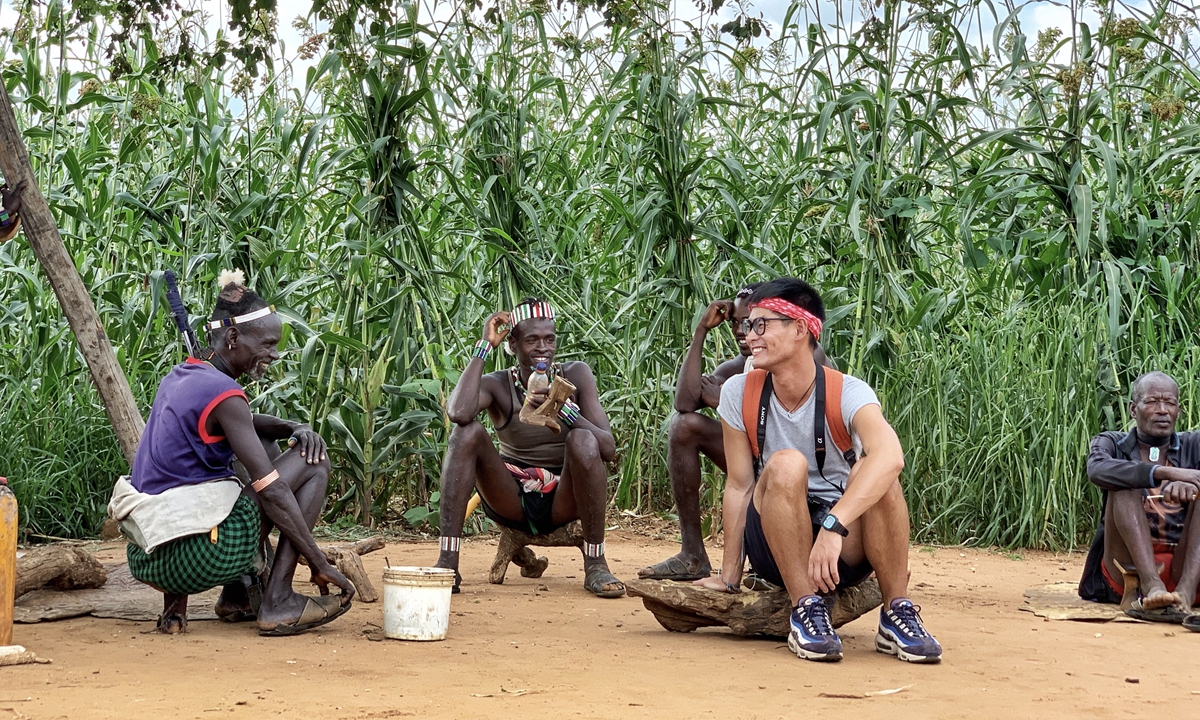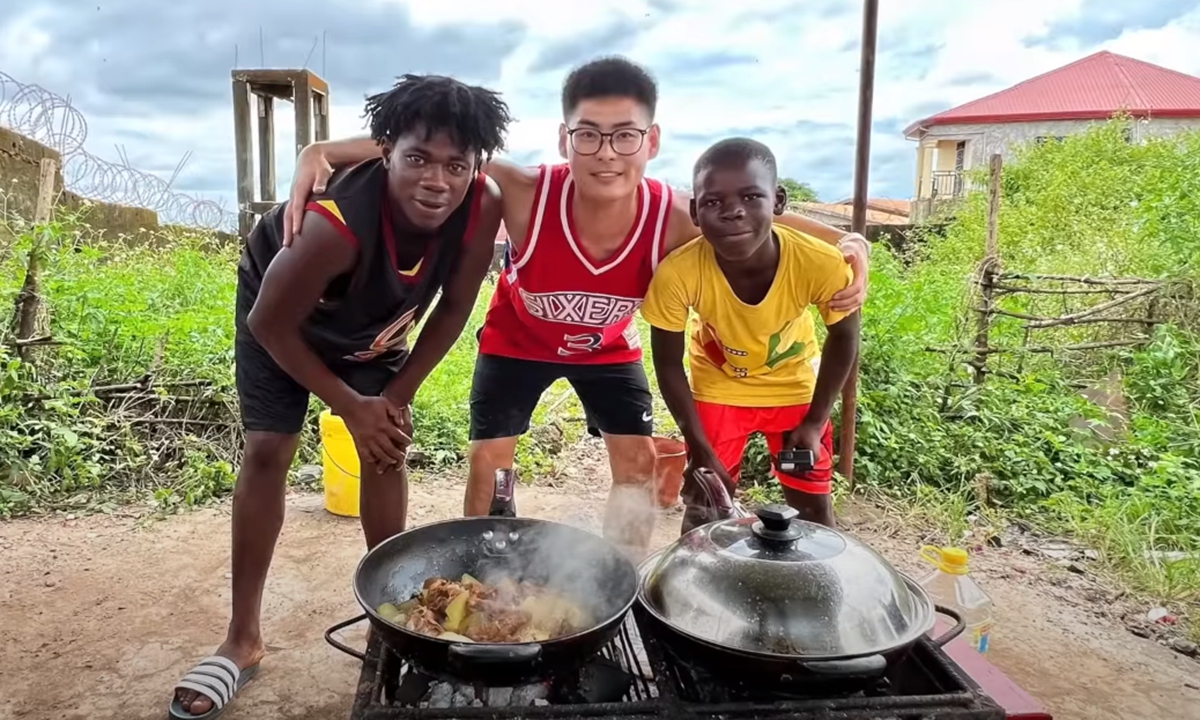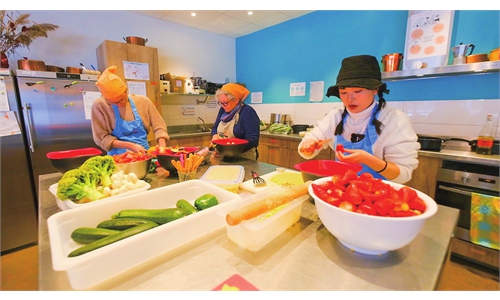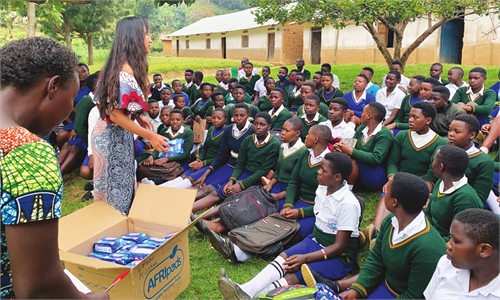IN-DEPTH / IN-DEPTH
Witness and record: Chinese content creator in Africa promotes understanding via vlogs, furthering China’s positive image
Editor's Note:
Young Chinese people in the new era are confident, aspirational, and responsible. With a global vision, they stand at the forefront of the times ready to fully commit to a more global outlook. Chinese people accept and quickly respond to the world's trending schools of thought. Some members of China's Generation Z have begun to practice the tenets of their "global citizen" identity and use their thought processes and actions to influence the society.
The Global Times has therefore launched a series of introductory stories to China's Gen Zers who are interested in different global topics, such as environmental protection, equality, and employment issues, and invites them to share their stories, sentiments, and ideas on social media platforms.
In this installment, we met two young Chinese YouTubers based in Africa and have been making videos to show life on the continent to the Chinese audience, as well as introducing China to African friends to promote understanding between China and Africa.

Zhong, a 27-year-old Chinese YouTuber based in Togo's capital Lomé, has showcased his experiences in Africa over the last two years. He has traveled to almost 20 African countries and made more than 300 vlogs, garnering more than 650,000 followers on Bilibili and over 220,000 on YouTube.
A series on his channel shows interviews with Chinese people who work in Africa. For instance, Zhong talked to a Chinese teacher at a local high school, a young translator at a Chinese company, and a grocery store owner from a rural area in North China's Hebei Province who brought his entire family to Africa.
These videos show different possibilities of what can be achieved in another land far from China. "Some of my audience came to Africa to work or invest after watching my videos," Zhong told the Global Times, adding that "they learned that Africa is a place of potential, vitality, and progress."
Breaking stereotype
Two years ago, Zhong followed his girlfriend to Lomé. He, like many young people, began to record his daily experiences and share them on social media platforms. But he did not expect that this would make him popular.
He gradually gained followers over the years. People appreciate his humble and warm narration in his vlogs, and love to see what Africa really is like today.
Many young Chinese people are seeing the more positive side of Africa through his eyes, which has broken the stereotype about Africa in many audience's minds.
"It turns out that Africa is not about poverty, hunger, and war," read a comment. "After seeing Xiao Zhong, I would like to visit Africa myself," said another commenter.
"I have traveled to Cote d'Ivoire and Gabon. Through my videos, people have learned that the roads and general infrastructure there are actually very good, and the people's lives are very comfortable," Zhong told the Global Times.
"They asked me, 'Is this really Africa?' My vlogs provide some subversive information and change people's outdated views on Africa," he said.
He has interviewed many Chinese people working in Africa, including members of a Chinese medical team in Africa, Chinese language teachers, employees in Chinese companies who are deeply involved in the African market, and individual owners of restaurants and homestays in Africa.
The videos show what is possible in foreign lands far from China. "Some compatriots working in Africa shared my videos with their families to ease their concerns," Zhong said. "From my video, they understand that Africa is actually a friendly place that's emergent and full of potential, vitality, and business opportunities."
Increasing understanding

This is also showed in Zhong's vlogs - African people are on the street watching popular Chinese dramas, and children following along to the rhythms of popular Chinese songs to dance.
In Africa, Zhong has made several local friends who speak fluent Chinese. They are either students in colleges, or those who work in Chinese companies.
Zhong said that with the increase of China's investment in Africa, young Africans are beginning to realize that mastering the Chinese language means more development space and career opportunities. Therefore, many young people have begun to learn Chinese by watching Chinese films and television shows, and have thus fallen in love with Chinese culture.
"My African friends told me that most countries in Africa are Anglophone and Francophone, but that doesn't mean that they are naturally close to Western culture," Zhong said, "Previously, African people did not have many channels through which to access Chinese culture. Now, with the frequent interactions between China and Africa at all levels, many African people have more opportunities to be exposed to Chinese culture and have begun to love Chinese culture."
According to a survey by South Africa's Ichikowitz Foundation in June, 76 percent of the young people view China's influence as positive, while 77 percent see China as the strongest foreign power on the continent, according to the Xinhua News Agency.
Ichikowitz Foundation Chairperson Ivor Ichikowitz said African youth have faith in the future of the relations between China and Africa, stressing that he believes that Africa and China can become "superpowers" in the future, according to Xinhua.
The tangible benefits of Africa-China cooperation have come to replace US-led diplomatic grandstanding and political meddling by American envoys to the continent, analysts said. China's role in Africa has evolved with the continent's needs, from helping Africa free itself from the claws of colonialism, to the current struggle for economic development, analysts remarked.
Trade between China and Africa reached an all-time high in 2021 of $254 billion, from about $10 billion in 2000, according to the Xinhua News Agency.
Between 2005 and 2021, China organized 160 poverty reduction and foreign aid training programs. Some 2,700 people from 53 African countries participated in said programs, accounting for almost 60 percent of the total number of trainees.
Young Chinese people in the new era are confident, aspirational, and responsible. With a global vision, they stand at the forefront of the times ready to fully commit to a more global outlook. Chinese people accept and quickly respond to the world's trending schools of thought. Some members of China's Generation Z have begun to practice the tenets of their "global citizen" identity and use their thought processes and actions to influence the society.
The Global Times has therefore launched a series of introductory stories to China's Gen Zers who are interested in different global topics, such as environmental protection, equality, and employment issues, and invites them to share their stories, sentiments, and ideas on social media platforms.
In this installment, we met two young Chinese YouTubers based in Africa and have been making videos to show life on the continent to the Chinese audience, as well as introducing China to African friends to promote understanding between China and Africa.

Zhong Jiahao with local friends in Ethiopia. Photo: Courtesy of Zhong
Trying foreign street food, dancing with talented village kids, fishing in the Atlantic, hanging out with African college students who speak fairly fluent Chinese and know Chinese actors well… This is what has been showcased in Zhong Jiahao's channel about his life in Africa.Zhong, a 27-year-old Chinese YouTuber based in Togo's capital Lomé, has showcased his experiences in Africa over the last two years. He has traveled to almost 20 African countries and made more than 300 vlogs, garnering more than 650,000 followers on Bilibili and over 220,000 on YouTube.
A series on his channel shows interviews with Chinese people who work in Africa. For instance, Zhong talked to a Chinese teacher at a local high school, a young translator at a Chinese company, and a grocery store owner from a rural area in North China's Hebei Province who brought his entire family to Africa.
These videos show different possibilities of what can be achieved in another land far from China. "Some of my audience came to Africa to work or invest after watching my videos," Zhong told the Global Times, adding that "they learned that Africa is a place of potential, vitality, and progress."
Breaking stereotype
Two years ago, Zhong followed his girlfriend to Lomé. He, like many young people, began to record his daily experiences and share them on social media platforms. But he did not expect that this would make him popular.
He gradually gained followers over the years. People appreciate his humble and warm narration in his vlogs, and love to see what Africa really is like today.
Many young Chinese people are seeing the more positive side of Africa through his eyes, which has broken the stereotype about Africa in many audience's minds.
"It turns out that Africa is not about poverty, hunger, and war," read a comment. "After seeing Xiao Zhong, I would like to visit Africa myself," said another commenter.
"I have traveled to Cote d'Ivoire and Gabon. Through my videos, people have learned that the roads and general infrastructure there are actually very good, and the people's lives are very comfortable," Zhong told the Global Times.
"They asked me, 'Is this really Africa?' My vlogs provide some subversive information and change people's outdated views on Africa," he said.
He has interviewed many Chinese people working in Africa, including members of a Chinese medical team in Africa, Chinese language teachers, employees in Chinese companies who are deeply involved in the African market, and individual owners of restaurants and homestays in Africa.
The videos show what is possible in foreign lands far from China. "Some compatriots working in Africa shared my videos with their families to ease their concerns," Zhong said. "From my video, they understand that Africa is actually a friendly place that's emergent and full of potential, vitality, and business opportunities."
Increasing understanding

Zhong Jiahao with local friends in Guinea. Photo: Screenshot of Zhong's vlog on Bilibili
Not only is the younger generation's interest in Africa increasing, but more Africans, especially the young generation, are getting to know China through television and language learning. Behind the increased understanding and affection between China and Africa is China's cooperation and assistance in various fields in the continent for many years.This is also showed in Zhong's vlogs - African people are on the street watching popular Chinese dramas, and children following along to the rhythms of popular Chinese songs to dance.
In Africa, Zhong has made several local friends who speak fluent Chinese. They are either students in colleges, or those who work in Chinese companies.
Zhong said that with the increase of China's investment in Africa, young Africans are beginning to realize that mastering the Chinese language means more development space and career opportunities. Therefore, many young people have begun to learn Chinese by watching Chinese films and television shows, and have thus fallen in love with Chinese culture.
"My African friends told me that most countries in Africa are Anglophone and Francophone, but that doesn't mean that they are naturally close to Western culture," Zhong said, "Previously, African people did not have many channels through which to access Chinese culture. Now, with the frequent interactions between China and Africa at all levels, many African people have more opportunities to be exposed to Chinese culture and have begun to love Chinese culture."
According to a survey by South Africa's Ichikowitz Foundation in June, 76 percent of the young people view China's influence as positive, while 77 percent see China as the strongest foreign power on the continent, according to the Xinhua News Agency.
Ichikowitz Foundation Chairperson Ivor Ichikowitz said African youth have faith in the future of the relations between China and Africa, stressing that he believes that Africa and China can become "superpowers" in the future, according to Xinhua.
The tangible benefits of Africa-China cooperation have come to replace US-led diplomatic grandstanding and political meddling by American envoys to the continent, analysts said. China's role in Africa has evolved with the continent's needs, from helping Africa free itself from the claws of colonialism, to the current struggle for economic development, analysts remarked.
Trade between China and Africa reached an all-time high in 2021 of $254 billion, from about $10 billion in 2000, according to the Xinhua News Agency.
Between 2005 and 2021, China organized 160 poverty reduction and foreign aid training programs. Some 2,700 people from 53 African countries participated in said programs, accounting for almost 60 percent of the total number of trainees.




